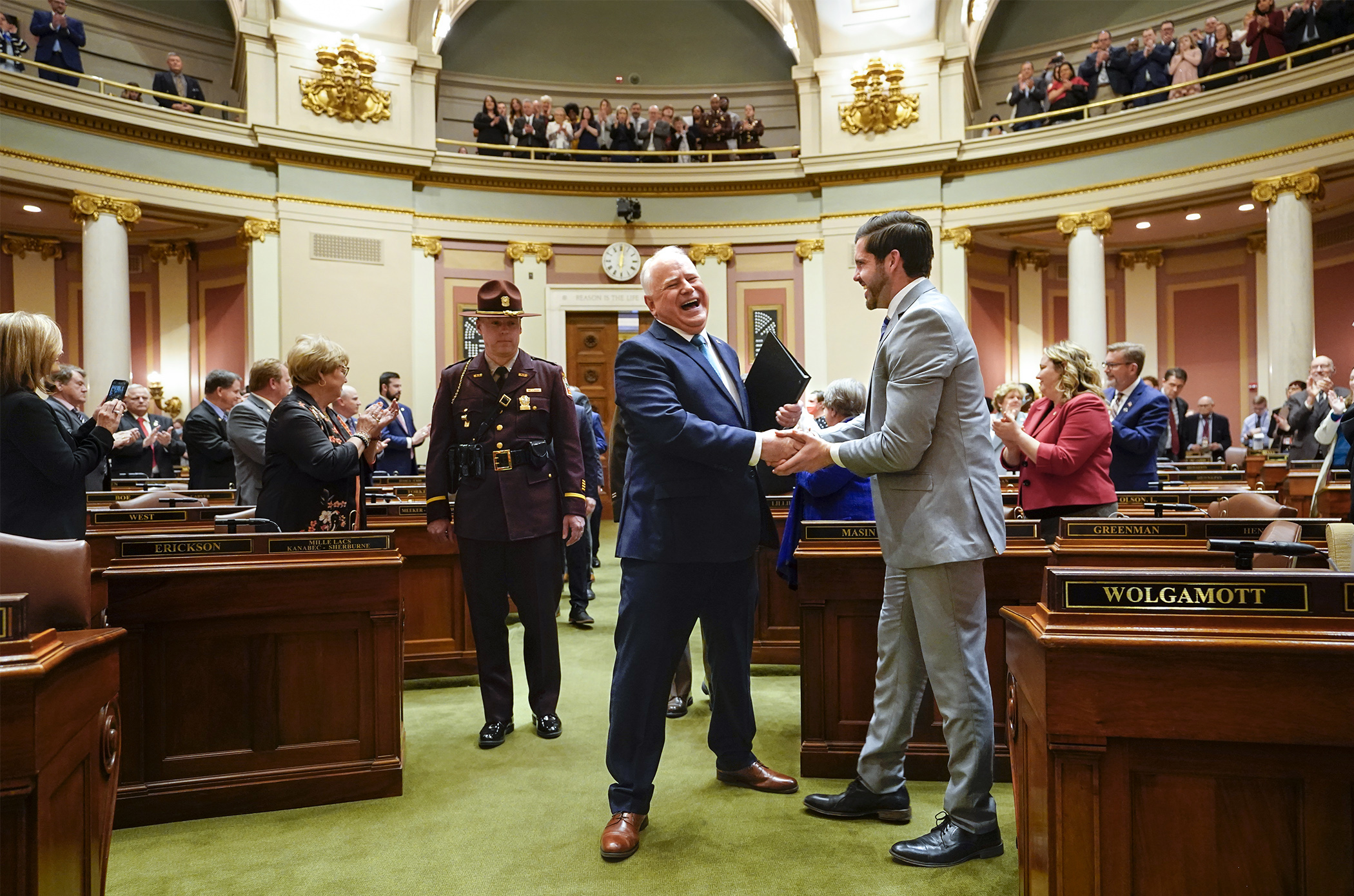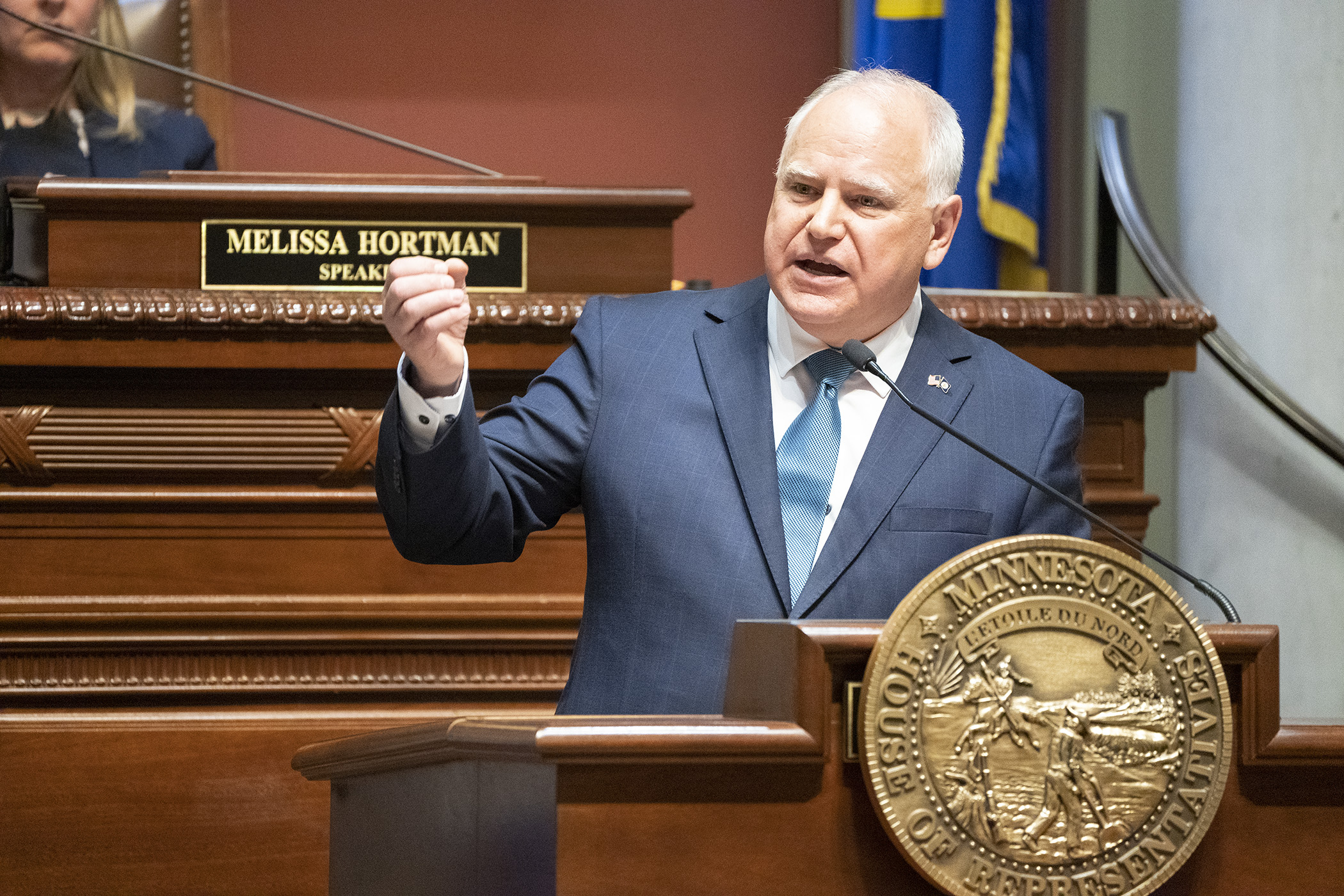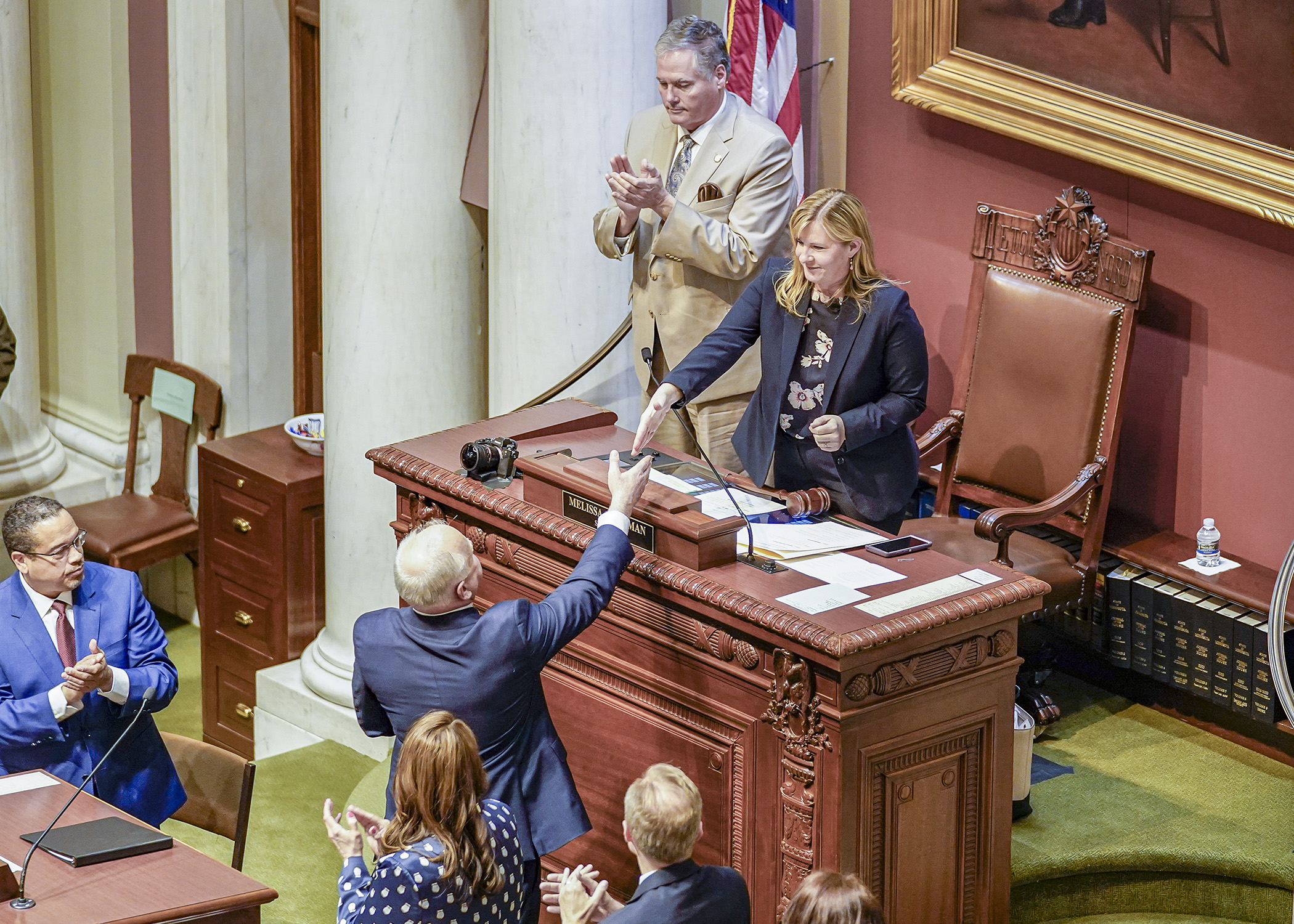State of the State returns to the Capitol as Walz touts ideas for the projected surplus

There’s been a paucity of pomp to Gov. Tim Walz’s last two State of the State addresses. During the COVID-19 pandemic, he delivered one via video from a room at the governor’s residence and another from a Mankato classroom.
But the sense of occasion returned on Sunday evening as he presented his speech to a joint legislative session, which made room in the House Chamber for the justices of the Minnesota Supreme Court, the state’s constitutional officers, former governor Mark Dayton, as well as many a guest given shout-outs during Walz’s 54-minute speech.
It was an address that maintained a tone of hopefulness throughout, one peppered with references to the resilience of Minnesotans and several proposals, each ending with an urgent exclamation of “Let’s do this” or “Let’s get this done” from the former football coach.
“The state of the state is strong, and Minnesota is moving forward,” Walz said. “If we invest in our people, we can’t get it wrong.”
But the governor cautioned that no side in the legislative debates will get exactly what it wants passed into law this year.
“I understand the fierce sense of urgency that makes you want to go big,” he said. “But a divided Legislature means that we have to compromise.”
The first issue Walz tackled in his talk was taxation. Speaking of the state’s projected $9.25 billion budget surplus, he said, “We should take some of this money and put it back into the pockets of working Minnesotans.”
In his supplemental budget, he’s suggested that come in the form of checks sent to each household in the state. But such a proposal hasn’t surfaced in the tax bills being considered by the House and Senate, and he focused instead in the speech on targeted tax cuts.
“We can cut taxes for middle-class folks and for folks trying to get into the middle class,” he said. “And we can cut taxes for the middle class without cutting taxes for large corporations and the wealthiest Minnesotans. … Cutting taxes for the wealthiest among us certainly won’t grow our economy from the middle out.
“But there are two issues that we need to deal with before that. The elephant in the room and the donkey in the room, if you will: Hero checks and the unemployment insurance trust fund.”
Walz wants to sign a bill into law as soon as possible to provide hazard pay to frontline workers forced to work through the pandemic and that would also restock the state’s unemployment fund.
 Gov. Tim Walz delivers his State of the State address to a joint convention of the Legislature April 24. (Photo by Paul Battaglia)
Gov. Tim Walz delivers his State of the State address to a joint convention of the Legislature April 24. (Photo by Paul Battaglia)“I understand that today progress is being made on this very issue,” he said. “If we take care of that, that would still leave us $6 billion to work with.”
Walz placed public safety near the top of his agenda.
“Our top priority is always the health and safety of Minnesotans,” he said. “I’m proposing a $300 million investment in these communities. For some, that will mean being able to hire the law enforcement professionals that they need. In other communities, it’s going to be able to modernize their 911 system. … This is not an issue in which it’s sufficient to just point out the problem. We need concrete results with measurable outcomes.
“But if we are really serious about getting tough on crime, then we need to get tough on the causes of crime, because that’s where it begins. That means moving back upstream. Tackling economic inequality issues, talking about housing, talking about gun violence. And then talking about issues like mental health and addiction.”
Among the other priorities the governor addressed in the speech were:
Child care: “Child care in this state was in crisis long before the pandemic. … Business is asking us to work on this. … We have a responsibility to build the workforce behind the workforce.”
Education: “We have the capacity to expand pre-kindergarten to 23,000 more children, which is going to change lives for generations to come. And once we get them on that path to success, we have to continue investing in them. … But there’s more to do. We have an opportunity with this budget, fiscally responsibly, to finally, for the first time, fully fund our schools the way we need to.”
 Gov. Tim Walz greets House Speaker Melissa Hortman before delivering his April 24 State of the State address. (Photo by Andrew VonBank)
Gov. Tim Walz greets House Speaker Melissa Hortman before delivering his April 24 State of the State address. (Photo by Andrew VonBank)Mental health care: “Minnesotans do so many things right, but we’re on the sidelines as far as counselors and mental health professionals in our schools. We shouldn’t be 49th or 50th [among states] for the number of professionals who are in there. … And, outside of school, let’s make sure there are enough in-patient beds for children in crisis that they’re not in an emergency room or not being shipped to Iowa to care for this. Let’s create that infrastructure here.”
Paid family leave: “No one should have to make a decision between getting a paycheck and taking a child to the doctor. … Don’t ask me. Ask 190 other nations and every Fortune 500 company. They invest in paid family leave. Large corporations do, because it retains a quality workforce and it increases productivity. … Let’s make sure that no small employers are left behind. Pass this paid family leave bill and let’s make a difference.”
Health care: Walz proposed extending funding for the state’s program for certified nursing assistants.
“I would challenge the governor to be more ambitious,” House Minority Leader Kurt Daudt (R-Crown) said after the speech. “This state needs permanent, meaningful tax relief back in the pockets of Minnesotans. We could cut taxes 10% across the board and still meet our demands in state government. … And the governor's [public safety] proposal of $300 million doesn't do anything to actually hold criminals accountable or recruit more people into law enforcement or support our current law enforcement.
“I agree with the governor to say let's work on what we can agree on now, but, unfortunately, that work hasn’t happened yet and here we are with four weeks left in session.”
But Daudt’s counterpart on the DFL side, House Majority Leader Ryan Winkler (DFL-Golden Valley), appreciated Walz’s agenda.
“Minnesotans work hard every day, but when hard work alone isn’t enough to get ahead or even make ends meet, something’s got to change,” he said. “As lawmakers enter the final stretch of this year’s session, Minnesotans will be watching, and they will remember who we fought for.”
Related Articles
Search Session Daily
Advanced Search OptionsPriority Dailies
Speaker Emerita Melissa Hortman, husband killed in attack
By HPIS Staff House Speaker Emerita Melissa Hortman (DFL-Brooklyn Park) and her husband, Mark, were fatally shot in their home early Saturday morning.
Gov. Tim Walz announced the news dur...
House Speaker Emerita Melissa Hortman (DFL-Brooklyn Park) and her husband, Mark, were fatally shot in their home early Saturday morning.
Gov. Tim Walz announced the news dur...
Lawmakers deliver budget bills to governor's desk in one-day special session
By Mike Cook About that talk of needing all 21 hours left in a legislative day to complete a special session?
House members were more than up to the challenge Monday. Beginning at 10 a.m...
About that talk of needing all 21 hours left in a legislative day to complete a special session?
House members were more than up to the challenge Monday. Beginning at 10 a.m...